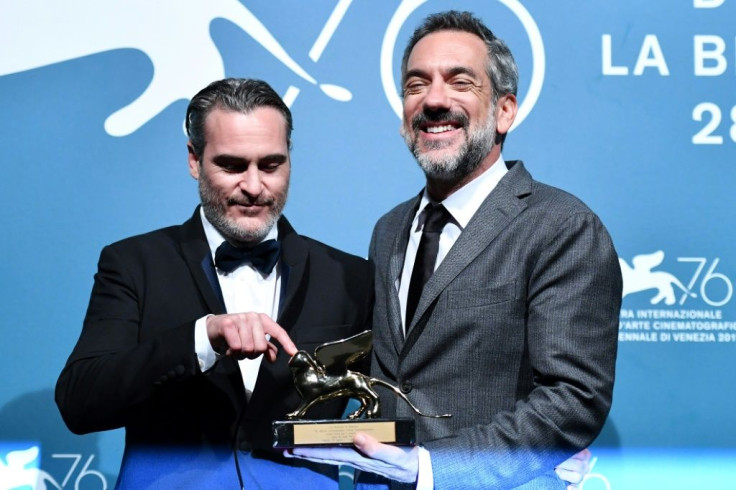'Joker', Polanski win top prizes at Venice film festival

"Joker", a daring take on the comic book villain starring Joaquin Phoenix, won the Golden Lion for best film at the Venice film festival Saturday with Roman Polanski controversially taking second prize.
It is the first superhero film ever to get this kind of arthouse kudos, and could now be on its way to Oscar glory.
The last two Venice winners -- "Roma" and "The Shape of Water" -- have gone on to lift the best picture Academy Award.
US director Todd Phillips -- best known up to now for the slapstick comedy "Very Bad Trip" -- paid tribute to Phoenix's intense performance, saying he was "the fiercest, bravest and most open-minded lion that I know".
"Thank you for trusting me with your insane talents," he said.
The movie, which The Guardian had described as "one of the boldest Hollywood productions for some time", has already sparked a heated debate.
And there were audible gasps when French-Polish director Polanski -- a pariah in Hollywood after his rape conviction -- was handed the Grand Prix second prize for his Dreyfus Affair drama, "An Officer and a Spy".
'Irresponsible propaganda?'
Within hours of the "Joker" premiere, some warned that Phoenix's full-throttle portrait of a needy, embittered clown who lives with his mother could empower incels (or involuntary celibates) -- the angry, misogynist young men who have been blamed for so much far-right and white supremacist violence.
Vanity Fair's Richard Lawson worried that it was "exhilarating in the most prurient of ways, a snuff film about the death of order, about the rot of a governing ethos".
He feared that it "may be irresponsible propaganda for the very men it pathologises".
But most critics disagreed, with Variety's Owen Gleiberman saying Phoenix has remade Batman's arch-enemy as a "Method psycho, a troublemaker so intense in his cuckoo hostility that even as you're gawking at his violence, you still feel his pain".
Other reviews were equally ecstatic, and a sequel with Robert Pattinson playing the Joker's nemesis Batman is said to be in the offing.
Phoenix reportedly lost more than 23 kilos (52 pounds) to play the part.
Phillips defended his film saying the jury "understood what we were trying to say, and I hope that translates".
Polanski wins second prize
But almost as many headlines are likely to be made by Polanski's win.
Having spent most of his life as a fugitive from American justice, he was accused of drawing "obscene" parallels between himself and the persecuted French Jewish army officer Alfred Dreyfus, who was the victim of anti-semitism and a miscarriage of justice around the turn of the 20th century.
Polanski, 86, has been shunned by the big studios for decades after he was convicted of drugging and raping a 13-year-old girl.
His inclusion in the main Venice competition, which included only two female directors, sparked fury from feminists.
The French-Polish auteur and Holocaust survivor did not show up at the festival, leaving his wife, French actress Emmanuelle Seigner -- who also appears in the film -- to pick up his prize to muted applause and a few isolated boos.
She later told reporters that her husband was "very happy" with his win, saying the "film was very important to him".
The head of the Venice jury, Argentinian director Lucrecia Martel, had boycotted a gala dinner for Polanski, only to be forced to clarify that she was not prejudiced against his film.
Jagger blasts Trump, Johnson
In a year fraught with controversy over sexual politics, festival director Alberto Barbera was also accused of being "tone deaf" for his inclusion of a Black Lives Matter drama by the American Nate Parker, who was embroiled in a rape trail while at university, as well as the director's cut of Gasper Noe's 2002 rape shocker "Irreversible".
Politics also dominated the awards ceremony with the best actor and actress winners -- Italy's Luca Marinelli ("Martin Eden") and France's Ariane Ascaride ("Gloria Mundi") dedicating their awards to the migrants who "rest forever at the bottom of the Mediterranean sea".
Both films contained references to people fleeing poverty and persecution.
Donald Sutherland, the star of the festival's closing film, "The Burnt Orange Heresy", had earlier appealed to reporters to support the migrants' cause.
His co-star, Rolling Stones singer Mick Jagger, made a rare foray into politics to attack US President Donald Trump for his rudeness, lies and tearing up environmental controls in the US.
He also bewailed "the polarisation and incivility in public life" in his native Britain, pointing the finger at its rookie prime minister, Boris Johnson.
© Copyright AFP 2024. All rights reserved.





















